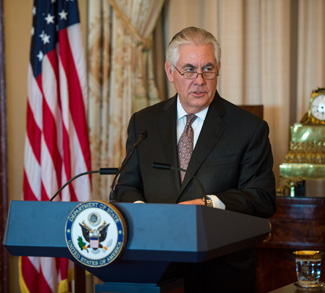Summary
US Secretary of State Rex Tillerson visited Turkey last week, enduring a frosty reception from the new AKP-dominated establishment that is in full campaign mode ahead of a crucial referendum. Turkey’s Islamist President Recep Tayyip Erdogan is seeking to expand the powers of his office through a constitutional referendum to be held on April 16, which critics fear will usher in ‘one man rule’ in the NATO member state and long-time US ally. The Trump administration has so far steered away from criticizing the ruling AKP and fiery its leader, instead prioritizing the defeat of the Islamic State threat in neighboring Iraq and Syria. Despite this circumspection on the part of the secretary of state, Mr Tillerson was still subjected to a barrage of Turkish complaints during his visit.
Some of these stemmed from Turkish conspiratorial thinking regarding US complicity in the attempted military coup against the AKP and Mr Erdogan last summer. More concrete complaints revolved around US support for Syrian Kurdish forces, whose ties to Turkey’s own Kurdish militants worry Ankara, and Western reluctance to extradite suspects in political cases to face Turkish justice. Turkey’s Foreign Minister Mevlüt Çavuşoğlu also complained about the case of Turkish businessman Reza Zarrab, an ally of President Erdogan who was detained in the U.S. on charges of engaging in sanctions-busting trade deals with Iranian entities. Mr Zarrab has a chequered past, having previously been detained in Turkey over corruption allegations tied to Mr Erdogan’s inner circle. There is speculation that Turkey is seeking a deal with the Trump administration to secure his release.
Background
Two more weeks until a key referendum. Turkey is preparing to hold a referendum under a state of emergency; a multi-faceted crackdown has been unfolding since the attempted coup last July. President Erdogan has also dispatched ministers to campaign abroad for the expatriate vote, causing friction between his administration and several European countries, whose citizen’s safety the combative Turkish leader has publicly threatened. Despite a solid domestic support base, and the mobilization of state resources in support of a ‘yes’ vote, analysts predict that the upcoming referendum will be very close, as the Turkish strongman is a divisive leader who is either loathed or loved.




